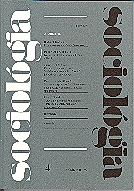O demokratizme občanov Slovenska
On Democratism Of The Citizens Of Slovakia
Author(s): Róbert RoškoSubject(s): Social Sciences
Published by: SAV - Slovenská akadémia vied - Sociologický ústav
Keywords: Citizenship; democratisation; transformation process
Summary/Abstract: On Democratism of the Citizens of Slovakia. The paper sums the findings about the level of democratization potential of Slovak population. They were obtained in three surveys done by the Institute for Sociology of the Slovak Academy of Sciences in the years 1992, 1993 and 1995. The first representative survey enabled to distinguish six types of citizenship. The three of them suggest an openess to democratisation, while the next three asppear to be rather conservative and retarding. Both groups of types were roughly equal in numbers. This fact gives the democratisation dimension of the transformation process in Slovakia the character of struggling, moreover, with uncertain ending. The data from the second survey enriched the typology with the dimension of economic transformation. The four citizenship types, differing by the level of "residual" bond to the values of the former regime, were revealed; 1. The type with authoritarian - egalitarian burden (14%). 2. The authoritarian type without egalitarian burden (14%). 3. The egalitarian type without authoritarian burden (34%) and 4. The type without authoritarian-egalitarian burden (37%). Comparision of these findings with those obtained in parallel survey in Czech Republic enabled to review the stereotypical idea of Slovak citizen as one typically burdened by egalitarianism and authoritarianism and Czech citizen as prevailingly free of these burdens. In the third survey done simultaneously in Czech Republic, Slovakia and Poland the typology criteria also included the criterion of "Euro-citizenship" potential. Data analysis results in eight types. The first (extreme) type is characteristic of acceptation of all objectives of societal transformation (democratisation + privatisation + European integration); SK = 11%, CZ = 17% and PR = 29%. The opposite extreme type shows generally negative relation to these objectives; SK= 11%, CZ = 6% and PR = 11%. From the six inconsistent types the most prevailing type in Slovakia is democrat with negative relation to privatisation and eurocitizenship (30%). This type is also enough saturated in Czech Republic (20%) and less in Poland (10%). Among the inconsistent types derived from Polish sample the most numerous are the two types with similar eurocitizenship potential but with deficit in privatisation potential (19%) and in privatisation and democratisation potential (18%). The core of the paper is the tests of separately measured democratism. The author deals with democratism of three kinds of social actors: individual actors, associated actors (political parties, civic movements, etc.) and so called general actors (governmental - state bodies). He gives special attention to enduring polarisation of Slovak society on the all three levels of social actors and is the most bulgy in the antagonism between the Slovak president and the government. These comparative survey findings support the opinion that the president versus government polarisation is the specific on
Journal: Sociológia - Slovak Sociological Review
- Issue Year: 1997
- Issue No: 4
- Page Range: 331-352
- Page Count: 22
- Language: Slovak

